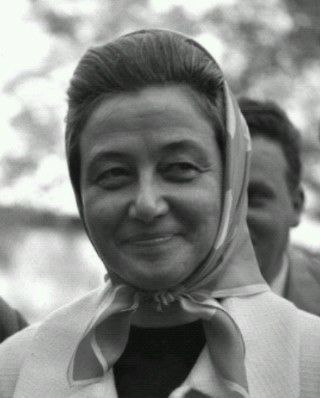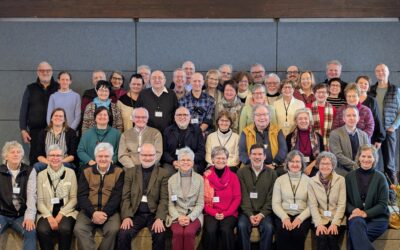 “I believe that God can and wants to make good to be born from everything, even from the worst malice.” These were the words of Dietrich Bonhoeffer at the end of 1943 when the world was in the throes of a global war. That was the historical context in which the Focolare Movement was born. The first stone was set in Trent, Italy, on December 7, 1943 when a young woman in her twenties consecrated her life to God: Silvia Lubich who went by her Third Order Franciscan name of Chiara (Claire). And the weather seemed to make the contrast even more severe, according to the account that Lubich gives of her walk at dawn towards the Capuchin College for a private ceremony, during which she would consecrate herself to God forever. “There was a storm raging, so I had to make my way pushing the umbrella in front of me. Even that wasn’t without meaning. It seemed to say that the action I was about to take would be met with obstacles. The water and wind blowing against me seemed like the symbol of an adversary. When I reached the college, the whole scene changed: A huge door opened in front of me on its own. There was a sense of relief and welcome, almost like God’s arms opening to me, as He was waiting for me.” That change of scene was reflected in her life. The completeness and sacredness of that action that took place in total seclusion and poverty – only three red carnations to celebrate with – were more sonorous in Chiara soul than all the atrocities of the War that stood as the backdrop, almost the “picture frame” of that scene. For her, the real scene was the one that God whom she had discovered to be Love was building around her. “There was an ideal, only one, that would never fall short, not even if we died. It was God-Love. And we were totally stuck on him with all the strength of our being. We didn’t stick to Him because we had nothing else left, but because a Force in us was rendering us happy at having discovered Him in our life as the only All, the only Eternal, the only one worthy of being loved, because love never passes away, the only one, therefore, who would fully satisfy our heart’s needs. For years we had been receiving Holy Communion every day and believed, since we belonged to all the Catholic associations, that we were good Catholics. Only insofar as the Lord God took everything away from us to give us only Him, did we understand the First Command of God for the first time in our life: “Love me with all your heart, all your mind…..” It was only then that we truly felt should love Him like that, so totally, heart, mind and strength, in order not to deceive ourselves.” Lucia Abignente, “Qui c’è il dito di Dio”, (Rome: Città Nuova, 2017), 25-26.
“I believe that God can and wants to make good to be born from everything, even from the worst malice.” These were the words of Dietrich Bonhoeffer at the end of 1943 when the world was in the throes of a global war. That was the historical context in which the Focolare Movement was born. The first stone was set in Trent, Italy, on December 7, 1943 when a young woman in her twenties consecrated her life to God: Silvia Lubich who went by her Third Order Franciscan name of Chiara (Claire). And the weather seemed to make the contrast even more severe, according to the account that Lubich gives of her walk at dawn towards the Capuchin College for a private ceremony, during which she would consecrate herself to God forever. “There was a storm raging, so I had to make my way pushing the umbrella in front of me. Even that wasn’t without meaning. It seemed to say that the action I was about to take would be met with obstacles. The water and wind blowing against me seemed like the symbol of an adversary. When I reached the college, the whole scene changed: A huge door opened in front of me on its own. There was a sense of relief and welcome, almost like God’s arms opening to me, as He was waiting for me.” That change of scene was reflected in her life. The completeness and sacredness of that action that took place in total seclusion and poverty – only three red carnations to celebrate with – were more sonorous in Chiara soul than all the atrocities of the War that stood as the backdrop, almost the “picture frame” of that scene. For her, the real scene was the one that God whom she had discovered to be Love was building around her. “There was an ideal, only one, that would never fall short, not even if we died. It was God-Love. And we were totally stuck on him with all the strength of our being. We didn’t stick to Him because we had nothing else left, but because a Force in us was rendering us happy at having discovered Him in our life as the only All, the only Eternal, the only one worthy of being loved, because love never passes away, the only one, therefore, who would fully satisfy our heart’s needs. For years we had been receiving Holy Communion every day and believed, since we belonged to all the Catholic associations, that we were good Catholics. Only insofar as the Lord God took everything away from us to give us only Him, did we understand the First Command of God for the first time in our life: “Love me with all your heart, all your mind…..” It was only then that we truly felt should love Him like that, so totally, heart, mind and strength, in order not to deceive ourselves.” Lucia Abignente, “Qui c’è il dito di Dio”, (Rome: Città Nuova, 2017), 25-26.
Take care of relationships
Take care of relationships




0 Comments